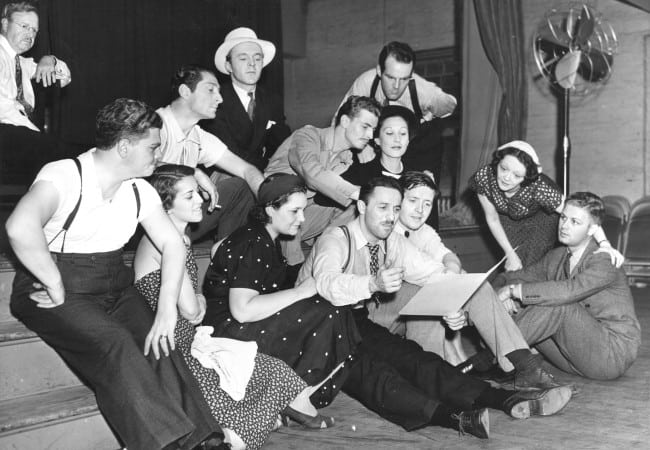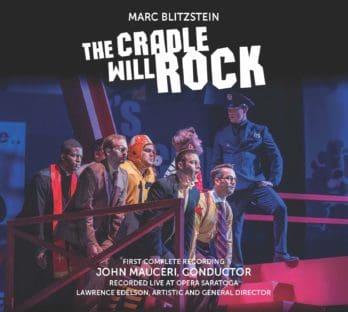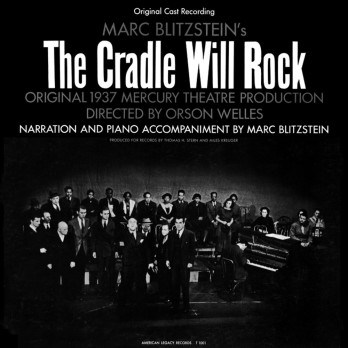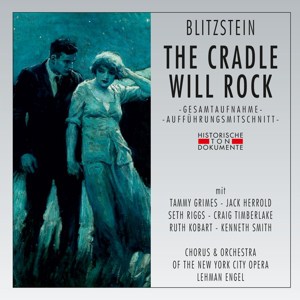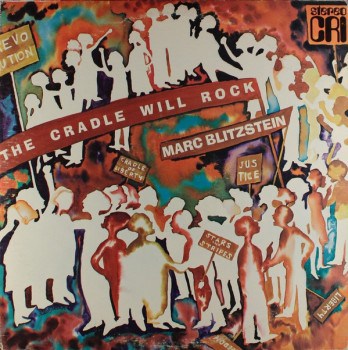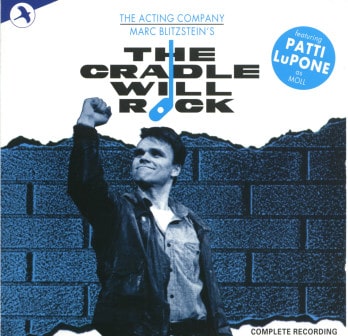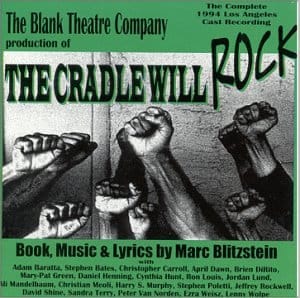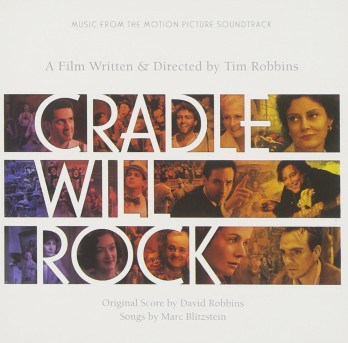Comment
Marc Blitzstein’s biggest and best-remembered hit, The Cradle Will Rock was a left-wing dream when it opened in 1937, in the middle of the Great Depression. Both an attack on wealth and the political power it brings, and a paean to labor and poor people struggling to get by, the show got a huge publicity boost from its legendary opening. The Federal Theatre production had been in rehearsal for weeks and was almost ready to go when the Works Progress Administration, the federal agency that oversaw the Federal Theatre, abruptly canceled the production and sent armed guards to keep any costumes or sets from being removed from the theater. Furthermore, Actors’ Equity barred cast members from performing the show onstage. Undeterred, Blitzstein, John Houseman, and Orson Welles found another theater and a battered upright piano; the cast and hundreds of onlookers marched uptown with them. As Blitzstein launched into the introduction, Olive Stanton (Moll) stood up in her seat and sang the opening number from the audience. The rest of the cast followed suit, and one of the greatest stories of American theater history was born.
About six months later, Cradle finally received its Broadway premiere; it was revived several times during Blitzstein’s lifetime: In 1947 with Leonard Bernstein conducting and Alfred Drake playing Larry Foreman, and in 1960 with New York City Opera. In 2013, the Encores! Off Center festival in New York brought out a concert performance with a brilliant cast, including Danny Burstein, Raul Esparza, Anika Noni Rose, and Judy Kuhn. The work received a warm welcome both for its music and text and for its continuing social relevance. The 21st century apparently needs Blitzstein’s powerful message just as much as the 20th century did.
In 2017, Opera Saratoga presented a new fully staged production, featuring the original orchestration to mark the work’s 80th anniversary. Read about that production here.
Cradle Will Rock Synopsis
Steeltown, USA, 1937. Moll, a prostitute, tries to attract a customer, but a detective intervenes to arrest her for soliciting. He mentions a union rally downtown. Then another policeman enters, having rounded up the anti-union Liberty Committee by mistake, and places them under arrest. Everyone proceeds to night court. The respectable members of the Committee protest their innocence as Harry Druggist looks on. He tells Moll about the all-powerful Mr. Mister, who runs the town, and points out that everyone has sold out to him one way or another. Then we hear a sequence of excerpted sermons given by Reverend Salvation that proves the point that he will say anything his paymasters tell him to say.
The scene shifts to Mr. Mister’s disreputable children (“Croon Spoon”). Mr. Mister himself commissions Editor Daily to dig up dirt on union organizer Larry Foreman, and the editor agrees (“The Freedom of the Press”). He also agrees to give Junior Mister a job and get him out of town (“Honolulu”). Then Harry Druggist tells his story; he cooperated with thugs working for Mr. Mister in setting up Gus Polock and his wife (“Gus and Sadie Love Song”) to be killed in an explosion. He hoped to preserve his drugstore by doing so, but he lost the store and his son and became a vagrant. The scene shifts to a conversation between Yasha, a musician, and Dauber, a painter (“The Rich”). They realize that they are both waiting for Mrs. Mister, their patron. When she arrives, they fawn over her, begging to be invited to a weekend party (“Art for Art’s Sake”). Back in the night court, Moll sings about poverty (“Nickel under the Foot”); Larry Foreman enters, charged with making speeches and distributing leaflets (“Leaflets”). He explains the power of unions in the class struggle (“The Cradle Will Rock”).
In the next scene, Mr. Mister visits President Prexy at the university to request a professor to help stir up the students against the union. Two of the professors are unsatisfactory, but football coach Professor Trixie fits the bill. Next, Mr. Mister visits Dr. Specialist; in the course of a check-up, he tells the doctor that he must testify that Joe Worker, a union organizer, was drunk when he fell and was injured. Dr. Specialist knows this is not true, but he wishes to maintain his position as head of the Liberty Committee. Joe’s sister Ella pleads with him to tell the truth and defend the working man (“Joe Worker”), but the doctor lies.
In the final scene, Mr. Mister appears and attempts to entice Larry with promises of more money and amenities for the workers (“Nickel under the Foot” reprise), but Larry is unmoved and threatens the wealthy and powerful with a more powerful union, which will brew up a storm that will knock the wealthy down from their perch at the top of the tree (“The Cradle Will Rock” reprise).
Performance materials available on rental from European American Music.
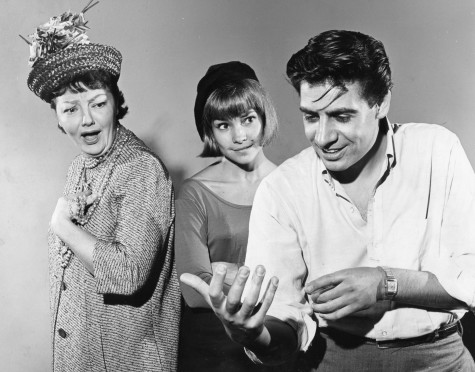
Music, Lyrics & Book by Marc Blitzstein Directed by Howard Da Silva
Shown from left: Nancy Andrews, Lauri Peters, Jerry Orbach
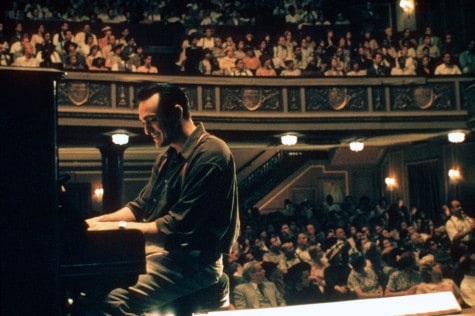
Press clippings
Blitzstein’s book retains a biting humor… The score is supple, eclectic and consistently engaging… A classically trained composer, [Blitzstein] knew his Bach and Beethoven, and riffs on both to comic effect in Cradle, but the score has a jaunty, driving appeal that ultimately owes more to jazz and other pop music forms… The music rambles widely across genres, to continually revivifying effect. And when Blitzstein allows the have-nots to step forward, the impulse to skewer recedes and he reveals a gift for gently soaring melody that can be enchanting.
– Charles Isherwood, New York Times (July 11, 2013)
To call it revelatory is an understatement. This searing, hilarious and deeply affecting production…exposed the rich theatricality of Blitzstein’s 1937 attack on the evils of unrestrained capitalism… A relevant and vital powerhouse in its swift 90-minute arc…[t]he savage humor and brazenness of this show still retains impact.
– Raphael Mostel, Jewish Daily Forward (July 16, 2013)
Blitzstein’s eclectic, mostly sung-through score is a jazzy, propulsive mix of classical parody, pop tunes and dramatic ensemble numbers. Some of the music is haunting (“Moll’s Song”), some of it is funny (“Croon Spoon”) and all of it is effective, with a smoky flavor redolent of Kurt Weill but all-American in its urgency.
– Michael Sommers, New Jersey Newsroom (July 12, 2013)
Infused with raw energy…Blitzstein…combined moments of realism, vaudeville, Brechtian detachment and other theatrical forms in his episodic story that continually shifted tone… His balance between spoken book dialogue and sung recitative is striking in its dramatic effectiveness.
– Michael Dale, Broadway World (July 12, 2013)

